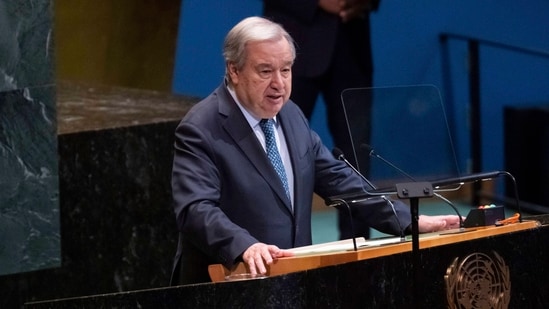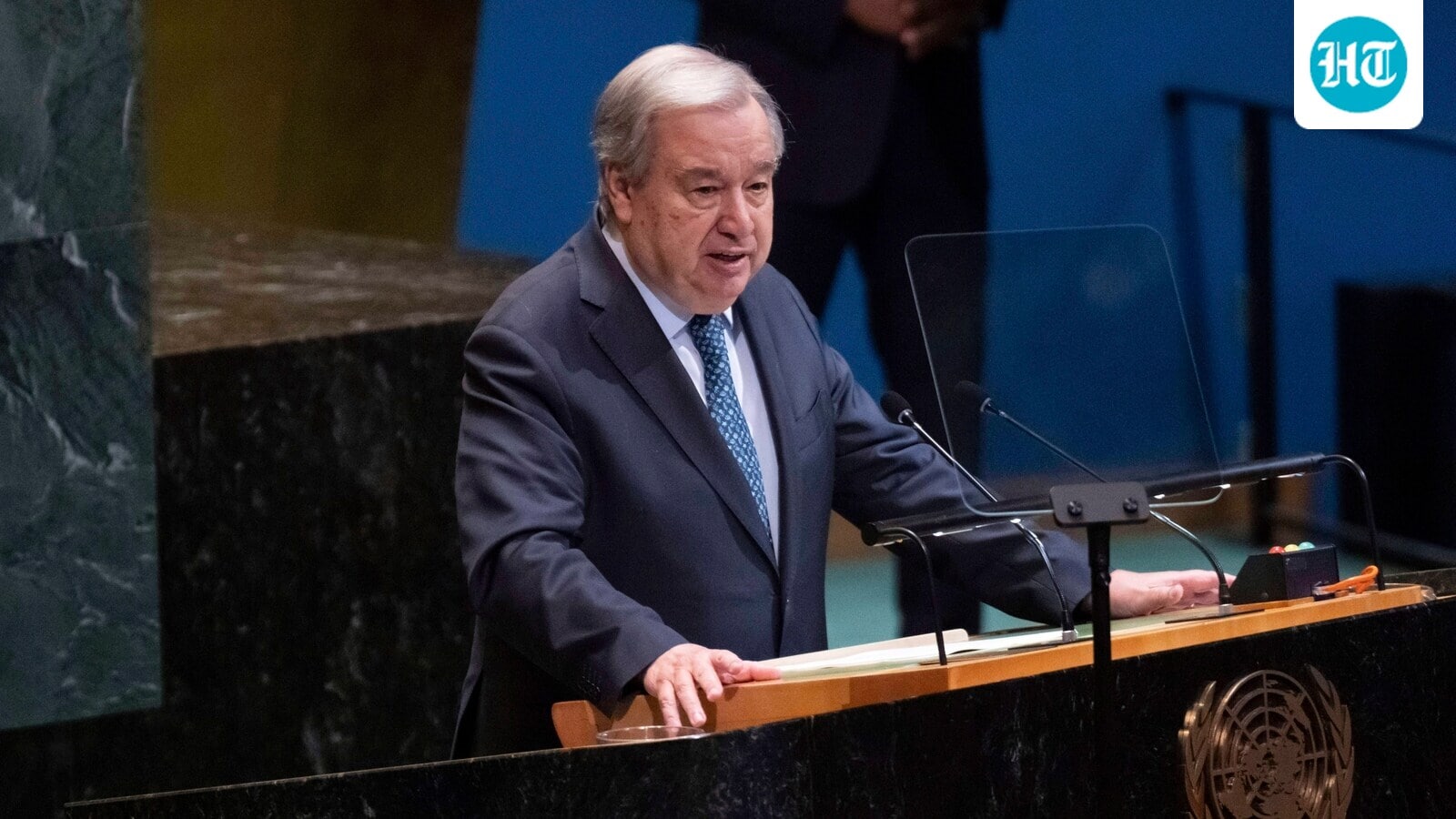The UN summit on Palestine, held on September 22, 2025 during the UN General Assembly session, is significant for rallying diplomatic support around the two-State solution amid the prolonged Gaza conflict. The summit took place against a backdrop of increasing international frustration with the Gaza war and Israel’s continued settlement expansion in the West Bank.
 United Nations Secretary General Antonio Guterres (AP)
United Nations Secretary General Antonio Guterres (AP)
The UN has increased pressure on Israel to end its occupation of Palestinian territories, driven by an overwhelming majority of member States. The summit and recent resolutions are part of a broader diplomatic effort to counter the narrative from Israel’s far-Right government, which has stated there will be no Palestinian State. In July 2025, a precursor conference co-chaired by France and Saudi Arabia adopted a “New York Declaration.” This framework, which was endorsed by the General Assembly on September 12, outlined a 15-month plan for a demilitarised, sovereign Palestine and included a phased action plan.
Several countries, including France, Monaco, Belgium, the United Kingdom, Canada, Australia, and Portugal, announced their recognition of a Palestinian State during or around the summit. This marked a significant diplomatic shift, especially among western nations.
Speaking at the conference, UN Secretary-General Antonio Guterres reiterated his support for the two-State solution, framing it as the only viable path towards peace after years of failed negotiations and ongoing violations on the ground. Guterres said that statehood for Palestinians “is a right, not a reward”, rejecting US and Israeli claims that it was a reward for Hamas.
Addressing the summit, President Emmanuel Macron said, “We have gathered here because the time has come, ” adding ” it falls on us, this responsibility, to do everything in our power to preserve the possibility of a two-State solution”. Macron said “Today, I declare that France recognises the State of Palestine”.
Saudi Arabia’s foreign minister, Prince Faisal bin Farhan Al Saud, thanked Macron and the UN chief for their efforts towards a two-state solution, which he said is “the only way to achieve just and lasting peace”. He said the conference comes at a time when “the Israeli occupation authorities continue their aggression and their brutal crimes” against Palestinians in Gaza, and Israel continues its “violations in the West Bank, and its repeated attacks on Arab and Muslim countries, with the most recent attack on Qatar”.
Expectedly, the Palestinian Authority (PA), led by President Mahmoud Abbas, welcomed the recognition as an “important and necessary step” toward peace. Abbas’s office said it would pave the way for a two-State solution. A Hamas official also called it a “welcomed step” that strengthened Palestinian rights but noted it must be accompanied by practical measures to end the conflict.
Israeli Prime Minister Benjamin Netanyahu immediately condemned the move, calling it a “reward for terrorism”. He vowed that a Palestinian State would not be established and threatened retaliation, including possible annexation of more West Bank land. Leaders from the far-Right factions of Israel’s government have condemned the international push for recognition. National security minister Itamar Ben-Gvir described recognition as a reward for murderers. Finance minister Bezalel Smotrich has advocated for asserting full sovereignty over the West Bank in response, arguing that there is “nothing to recognise and no one to recognise”.
Most Israeli leaders have expressed vehement opposition to UN recognition of a Palestinian State. Their position has been nearly unanimous across the political spectrum, particularly following the Hamas-led attacks on October 7, 2023.
The recognition of a Palestinian State by the UK, Canada, Australia, Portugal and France in September 2025 marks a shift in policy by some of Israel’s historic allies. This move aligns them with a majority of UN member States that already recognise Palestine. The leaders of these countries framed the recognition as a way to revive the prospect of a two-State solution. They expressed deep frustration over the perceived lack of progress and Israeli actions that are seen as undermining the possibility of an independent Palestinian State. Australia stated that the move reflected its “longstanding commitment to a two-State solution,” which it believes is the path to enduring peace.
The coordinated announcement by these western nations is intended to put diplomatic pressure on Israel, particularly over its ongoing war in Gaza and its policy of settlement expansion in the West Bank. The announcement by these traditional allies of Israel is also being understood as a rebuke of its actions in Gaza and stalled peace efforts. Palestine is now recognized as a sovereign State by 151 of the 193 member States of the UN. It has been a non-member observer state of the UN General Assembly since November 2012.
While the wave of new recognitions and UN declarations boosts Palestinian morale and puts growing international consensus on display, the actual impact on the ground remains uncertain. Recognition is largely symbolic and does not change the reality of the military conflict or the occupation. Its practical effects on the ground are limited without meaningful follow-up action.
Recognition alone does not end the Israeli occupation or create a sovereign Palestinian State. Control over territory, borders, and security remains unchanged. It allows these governments to appear tough on Israel without really implementing measures that would significantly affect its actions in Gaza and the West Bank. Full Palestinian membership in the UN, which would give it more weight, requires approval from the Security Council. As a permanent member with veto power, the US can block this.
The US remains vehemently opposed to the unilateral recognition of a Palestinian State, a position that has increasingly put it at odds with many of its key allies. The US has used its veto power to block a Palestinian bid for full UN membership, most recently in April 2024. The Trump administration, which returned to power in January 2025, has reaffirmed this position and taken concrete steps to undermine the effort.
In a statement on July 28, 2025, the US State Department called a UN-hosted two-State solution conference a “misguided and ill-timed publicity stunt” and “a gift to Hamas”. The US maintains that a Palestinian State should only be realised through direct negotiations between the parties.
In August 2025, the Trump administration revoked visas for Palestinian Authority officials ahead of the UN General Assembly, thus preventing their physical attendance at a UN summit on the two-state solution on September 22, 2025. The State Department stated this was to hold the PLO and PA accountable for “undermining the prospects for peace” and not condemning terrorism. The UN General Assembly later voted overwhelmingly to allow Abbas to address the assembly virtually.
The Trump administration’s stance represents a hardening of policy compared to the previous Biden administration, which also opposed unilateral recognition but expressed general support for an eventual two-state solution. The Biden administration, however, consistently favoured a two-State solution achieved through direct negotiations and not unilateral action.
The recognition of Palestine by western countries like France, UK, Canada, Australia and Portugal is not expected to change the reality in the West Bank and Gaza, where Israel continues its military operations and settlement expansion. Despite the diplomatic momentum, concrete outcomes will continue to face considerable challenges.
The UN summit on Palestine has yielded some diplomatic results, including increased international recognition of Palestinian statehood. However, it is not expected to produce immediate on-the-ground results that could end the war or establish an independent Palestinian State, given the staunch opposition from Israel and the US who retain the power to block significant progress through negotiations or UN channels.
This article is authored by Prabhu Dayal, former ambassador, New Delhi.

